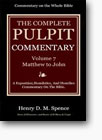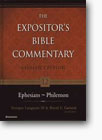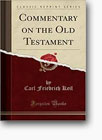- Table of Contents
- Introduction
- 1. The Beatitudes: Matthew 5:3-11
- 2. The Beatitudes: Matthew 5:3-11, Continued
- 3. The Beatitudes: Matthew 5:3-11, Continued
- 4. The Beatitudes: Matthew 5:3-11, Concluded
- 5. The Ministerial Office: Matthew 5:13-16
- 6. Christ and Law: Matthew 5: 17, 18
- 7. Christ and Law: Matthew 5: 17, 18, Continued
- 8. Christ and Law: Matthew 5: 17, 18, Concluded
- 9. The Law and Murder: Matthew 5:21-26
- 10. The Law and Murder: Matthew 5:21-26, Concluded
- 11. The Law and Adultery: Matthew 5:27-32
- 12. The Law and Adultery: Matthew 5:27-32, Continued
- 13. The Law and Adultery: Matthew 5:27-32, Concluded
- 14. The Law and Oaths: Matthew 5:33-37
- 15. The Law and Oaths: Matthew 5:33-37, Concluded
- 16. The Law and Retaliation: Matthew 5:38-42
- 17. The Law and Retaliation: Matthew 5:38-42, Continued
- 18. The Law and Retaliation: Matthew 5:38-42, Concluded
- 19. The Law and Love: Matthew 5:43-48
- 20. The Law and Love: Matthew 5:43-48, Continued
- 21. The Law and Love: Matthew 5:43-48, Concluded
- 22. The Giving of Alms: Matthew 6:1-4
- 23. Prayer: Matthew 6:5-8
- 24. Prayer: Matthew 6:9-13
- 25. Prayer: Matthew 6:14, 15
- 26. Fasting: Matthew 6:16-18
- 27. Fasting: Matthew 6:16-18, Concluded
- 28. Covetousness Corrected: Matthew 6:19-21
- 29. Covetousness Corrected: Matthew 6:19-21, Concluded
- 30. The Single Eye: Matthew 6:22, 23
- 31. The Single Eye: Matthew 6:22, 23, Concluded
- 32. Serving God: Matthew 6:24
- 33. Anxiety Forbidden: Matthew 6:25
- 34. Anxiety Forbidden: Matthew 6:25, Continued
- 35. Anxiety Forbidden: Matthew 6:28, 29
- 36. Anxiety Forbidden: Matthew 6:30, 31
- 37. Anxiety Forbidden: Matthew 6:32-34
- 38. Anxiety Forbidden: Matthew 6:32-34, Concluded
- 39. Unlawful Judgment: Matthew 7:1
- 40. Judging Others: Matthew 7:1
- 41. Dissuasives from Judging Other: Matthew 7:2-4
- 42. Helping Erring Brethren: Matthew 7:5
- 43. Unlawful Liberality: Matthew 7:6
- 44. Seeking Grace: Matthew 7:7, 8
- 45. Seeking Grace: Matthew 7:7, 8, Continued
- 46. Seeking Grace: Matthew 7:9-11
- 47. The Golden Rule: Matthew 7:12
- 48. The Way of Salvation: Matthew 7:13, 14
- 49. The Way of Salvation: Matthew 7:14, 15
- 50. False Prophets: Matthew 7:15
- 51. False Prophets: Matthew 7:15, Continued
- 52. False Prophets: Matthew 7:15, Continued
- 53. False Prophets: Matthew 7:15, Continued
- 54. False Prophets: Matthew 7:15-20
- 55. False Prophets: Matthew 7:15-20, Concluded
- 56. Profession Tested: Matthew 7:21-27
- 57. Profession Tested: Matthew 7:21-27, Continued
- 58. Profession Tested: Matthew 7:21-27, Continued
- 59. Profession Tested: Matthew 7:21-27, Continued
- 60. Profession Tested: Matthew 7:21-27, Continued
- 61. Profession Tested: Matthew 7:21-27, Continued
- 62. Profession Tested: Matthew 7:21-27, Continued
- 63. Profession Tested: Matthew 7:21-27, Concluded
- 64. Conclusion: Matthew 7:28, 29
An Exposition of the Sermon on the Mount
by Arthur W. Pink
Chapter Forty
Judging Others
Matthew 7:1
"Judge not, that ye be not judged" (v. 1). In the previous chapter we were obliged, so as not to exceed the usual length, to confine ourselves unto the first part of this brief verse. In it we sought to show what is here not forbidden, that there is a lawful judging which God requires us to exercise, both in public and in private. Then we pointed out no less than seven forms of unlawful judging, indicating that this prohibition of Christ's is a very comprehensive one. Our apology, if such be needed, for entering into so much detail is, first, because these words "judge not" are so frequently misunderstood and misapplied; and second, because the sin which is here forbidden is a very grievous one and has become exceedingly common. Some Christians are more prone to it than others, one in one way and one in another. It is a sin which may be committed in the house of prayer. When the minister is rebuking some evil or failure in some particular duty, there are often those present who will conclude he is addressing himself to some others in the congregation, which is one reason why so many reap so little from hearing the Word preached.
Now since it be wrong for us to judge one of our brethren or even our fellows presumptuously, hypocritically, hastily, unwarrantably, unjustly or unmercifully, how much more heinous must it be for us to give audible expression to the same and transmit it to others! Equally so is it for those who listen to us to repeat the same. "Thou shalt not go up and down as a talebearer among thy people" (Lev. 19:16): yet who among us can plead innocence therein? Alas, how many there are, now that the pulse of love beats so feebly, who take a devilish pleasure in spreading evil reports of fellow members and enlarging on the same. "A talebearer revealeth secrets: but he that is of a faithful spirit concealeth the matter" (Prov. 11:13). Equally reprehensible is it for us to censure and hold up to scorn those of another denomination, unless the Scriptures plainly condemn them. "Speak evil of no man's (Titus 3:2) forbids us expressing anything to the discredit or disadvantage of another to anyone but to oneself, except where duty demands it—the putting others on their guard against an evil-doer or a doctrinal corrupter.
It should be pointed out that veracity is not the only virtue which needs to be exercised whenever we make report of the character and conduct of another. To say of such and such a person, "He possesses this or that virtue, but—well, least said, soonest mended," is far worse than saying nothing at all, for such an utterance insinuates to our hearers that there is some grave evil in the party to whom we have alluded. We may say nothing but what is the truth, yet by the very manner in which we express ourselves suggest that a certain person is not to be trusted. Thus when David came to Ahimelech begging bread for his men and requesting some weapon, and the priest granted him the sword of Goliath (1 Sam. 21), Doeg, who witnessed the transaction, put his knowledge to a wicked use by reporting the same unto Saul, implying that Ahimelech had entered into a conspiracy with David against the king's life; and the telling of the truth from such an evil motive and in such a manner cost the lives of eighty-five priests (1 Sam. 22:18): again we say, Behold how great a fire a little matter kindleth!
"Judge not, that ye be not judged." After the commandment there follows a reason which is designed to cause us to make conscience of forming and expressing unlawful judgments; or, more accurately speaking, the second part of the verse is a dissuasive, a warning against the sin forbidden at the beginning of it. But precisely what is the nature of this warning, exactly what did our Lord here have in mind? Nearly all the expositors see in it nothing more than a threat that we must be prepared for our fellows treating us just as we treat them: that if we asperse people, others will slander us; that if we be harsh and censorious in the estimates we form of our fellows, then we in turn shall receive unkind treatment, being paid back again in our own coin. On the other hand, if we be charitable and merciful, ready to think the best and slow to think the worst of any, then others will in turn deal gently and considerately with our reputation. In brief, that the words "that ye be not judged" signify lest ye be unlawfully and unfairly judged by men.
Now we do not believe this common interpretation of Christ's warning gives the full or even the principal force of it, and that for several reasons. First, because the usual sense accorded it is one which has little weight with those who are walking with God. It is true there are many professing Christians who are greatly concerned about what others think and say of them, who are most anxious to shine in their eyes, who are very jealous of their own reputations and easily hurt if anyone slights them or speaks a word against them, yet all of this has its roots in pride and self-esteem. But one who is walking with God, who is painfully conscious of the plague of his heart, who in some measure at least sees himself as God sees him, is so thoroughly aware of his awful corruptions, his many inward and outward defects, that he knows quite well that the worst men can say against him falls far short of the estimate he has of himself. The one who unsparingly judges himself is unruffled by the criticisms of others.
When one is truly walking with God his only concern is what his Divine Master thinks of him. If he makes conscience of all that displeases Him, if he daily confesses to Him every known sin and begs Him to cleanse him from sins of ignorance and omission, if he be sincerely endeavoring to walk in the path of obedience, it will trouble him very little what other worms of the dust think or say about him. He is conscious of the fact that God knows his heart, that if only he has the approbation of the Lord this is worth infinitely more than the highest esteem of all mankind. Said the apostle Paul, "But with me it is a very small thing that I should be judged of you" (1 Cor. 4:3): their opinion mattered nothing, his responsibility was not unto them. "Yea, I judge not mine self," he added: Christ alone is my Lord and Judge, by Him I stand or fall. Blessed liberty is it when we are delivered from being in bondage to the fickle opinions and estimates of man, who will one day cry Hosannah" and the next day "crucify."
It is not that walking with God produces a spirit of egotism which causes one to have so high regard of himself that he considers he is outside the range of human judgment: no, far otherwise. Nor will he disdain a correction or admonition when he needs it: rather will he say with David, "Let the righteous smite me, it shall be a kindness; and let him reprove me; it shall be an excellent oil, which shall not break my heady' (Ps. 141:5). A truly humble soul will weigh before God the reproofs of the righteous. "Rebuke a wise man, and he will love thee" (Prov. 9:8), for he knows full well that "faithful are the wounds of a friend, but the kisses of an enemy are deceitful." "As an earring of gold, and an ornament of fine gold, so is a wise reprover upon an obedient ear" (Prov. 25:12): alas, how few with an "obedient ear" are now left! But while welcoming needful reproofs and being thankful for the faithful dealings of those who wish him well, this is vastly different from being the prey of public opinion, fearful of being misunderstood, wondering what one and another will say of us, even while we are doing that which is right.
Second, we find it very difficult to persuade ourselves that when the Lord said "Judge not, that ye be not judged" He had reference to nothing else, nothing more solemn and searching than, Refrain from passing unlawful judgment upon others lest you meet with the same treatment at the hands of your fellows. Such a warning has little weight with the majority of professors and none at all with those who are walking in the fear of God, for where His fear possesses the heart it is delivered from the fear of man. Furthermore, it seems entirely out of accord with the whole tenor of His Sermon, with the searching character of all its details, that He should introduce and make so prominent (note the following verse) what is after all but a secular motive. In a discourse, one chief design of which was to make plain the spirituality of the Christian character in contrast with the worldly character of the Pharisee, Christ would surely employ a weightier dissuasive than the mere fear of suffering from the fickle judgments of fellow mortals.
Third, and what is more decisive, the idea that "judge not, that ye be not judged" means we shall in this matter reap in this world exactly as we sow—that if we defame others we also shall be defamed, that if we refrain from rashly and censoriously censuring others we shall ourselves be spared the experience—will not stand the test of Holy Writ. Apply it to the Lord Jesus Christ and the treatment which He met with from man: He never unjustly or unmercifully censured another, yet how frequently were false and cruel charges preferred against Him. Apply the principle to the life of the apostle Paul and see how completely it breaks down; can we suppose that God had employed him to write 1 Corinthians 13 had he been of a censorious, carping, pharisaical spirit? Yet he was "defamed" on every side and accounted "the offscouring of all things" (1 Cor. 4:13)! No, such an explanation, such a theory, will stand neither the test of Scripture nor of Christian experience and observation today.
"Judge not, that ye be not judged." In view of what has been pointed out we cannot avoid the conviction that many of the commentators unwittingly toned down this solemn portion of the Truth, blunting the sharp edge of the sword of the Spirit, for it seems clear to us that some vastly more awe-inspiring motive was in our Lord's mind, a far weightier dissuasive from the sin forbidden than the treatment we shall meet with at the hands of our fellows. We are persuaded that what Christ here had reference to was not the judgments of men but the judgments of God, not the decisions of time but the verdicts of eternity. In reality it is but a sop for the conscience, a sewing of " pillows to all armholes" (Ezek. 13:18), to tell people if they be guilty of transgressing this precept and unlawfully judging others that all they have to fear is being unrighteously judged by their fellows. But for Christ to declare that such conduct will meet with Divine judgment at the Awful Assize is a warning which may well make the most thoughtless to consider and the stoutest heart to quake.
But it should be pointed out that this warning of Christ's is not to. be understood as meaning: If you be generous in the verdicts you pass upon others, God will be lenient in His judgment concerning you; that if you be harsh and cruel, God will deal severely with you. No, whatever our judgments of others may be, God's judgment will be "according to truth" and that without "respect of persons" (Rom. 2:2, 11). Thus we understand our Lord to mean: Beware of forming wrong judgments of your brethren and fellow men, especially hasty and unmerciful ones, for all your judgments are to be reviewed in the searching light of God's throne, and by those judgments you are yourselves to be then judged. Not that the judgments we form of each other are to be the sole test by which our profession will be weighed and our character tried, but that this will be one of the tests. "By thy words thou shalt be justified, and by thy words thou shalt be condemned" (Matthew 12:37) will be another; our treatment of Christ's brethren, as Matthew 25 plainly intimates, will be yet another. Take care then that your judgments of others be such as will endure the scrutiny of the Divine Judge, for if they are not they must lead to disapproval.
We are well aware of the fact that what we have said above is contrary to most of the teaching of the day even in orthodox circles. So much emphasis has been laid upon certain favorite verses that the balance of Truth has been lost here, as it has almost everywhere else. Such a statement as He hath not beheld iniquity in Jacob, neither hath He seen perverseness in Israel" (Num. 23:21) has been interpreted to mean that God looks not upon His people as they are in themselves but ever views them in Christ, and therefore sees them as without any sin. But such an idea is flatly contradicted by Holy Writ. God does take cognizance of our sins and plainly declares: "If His children forsake My law and walk not in My judgments; . . . If they break My statutes and keep not My commandments; . . . Then will I visit their transgression with the rod and their iniquity with stripes" (Ps. 89:30¬32). Believers are required to confess their sins, and both their forgiveness and cleansing are made contingent thereon (1 John 1:9). It is blessedly true that the believer has a perfect standing or status before God, yet that must not be made to swallow up his state and present case.
We would not for a moment consciously weaken the glorious force of "There is therefore now no condemnation to them which are in Christ Jesus" (Rom. 8:1), and "he that heareth My Word, and believeth on Him that sent Me, hath everlasting life, and shall not come into condemnation [Greek "judgment "I; but is passed from death unto life" (John 5:24). Yet those verses must not be understood in such a way as to clash with other portions of God's Word, such, for example, as "For the time is come that judgment must begin at the House of God" (1 Pet. 4:17). No born-again soul shall ever suffer the eternal judgment of God, for he has for ever passed beyond the reach of penal death or the curse of the Law, Christ having suffered the curse on his behalf. But though beyond the curse of the Law, Christians are subject to the government of God, and that government will not make light of wrongdoing nor relinquish its righteous requirements. Sin is no less sinful when committed by a believer than by an unbeliever, and unless it be repented of or put right before God in this life it will have to he put right in the Day to come. And who that loves holiness would wish it were otherwise? Many a breach between fellow Christians is never healed in this world: must not things be put right between them before they can spend eternity together in heaven?
Both the orthodox pulpit and what is regarded as sound literature convey the impression that no matter how grievously the Christian may have failed in his duty, he has nothing to fear so far as the next life is concerned, that however careless and fruitless he has been, unclouded bliss awaits him after death. But between death and eternity proper is the Day of Judgment! But the Truth is now so watered down and so accommodated to the carnal mind that the Lord's people are led to believe complacently that so far as they are concerned that Day will be solely one of receiving rewards and words of praise. But this writer does not so read the Scriptures: he finds another class of passages which set forth quite a different aspect of the Truth, and though these passages be almost universally shelved, or "explained away" when pressed upon the attention of those claiming to be Christians, he dare not ignore them or fritter them down.
"But why dost thou judge thy brother? or why dost thou set at nought thy brother? for we shall all stand before the judgment seat of Christ. For it is written, As I live, saith the Lord, every knee shall bow to Me, and every tongue shall confess to God" (Rom. 14:10-11). We merely call attention to the bare fact that the judgment seat of Christ is here set before believers as a solemn motive to refrain from judging their brethren, a motive which will have no force if commendation is all they are to receive there; and that this warning is immediately followed with "So then every one of us shall give account of himself to God": that this rendering of accounts will be something more than a mere formality scarcely needs to be pointed out. "Every man's work shall be made manifest: for the day shall declare it, because it shall be revealed by fire; and the fire shall try every man's work of what sort it is. If any man's work abide which he hath built thereupon, he shall receive a reward. If any man's work shall be burned, he shall suffer loss: but he himself shall be saved; yet so as by fire" (1 Cor. 3:13-15). This has reference to the adjudication of the labours of Christ's servants, when their work will be subjected to the searching scrutiny of Divine holiness: "saved, yet so as by fire" certainly does not suggest a happy experience—not that we understand there is anything in these verses which furnishes the slightest support to the popish "purgatory." Ministers would do well seriously to ponder this passage and turn it into earnest prayer.
"For we must all appear before the judgment seat of Christ: that every one may receive the things done in his body, according to that he hath done, whether good or bad" (2 Cor. 5:10). The "we" takes in the whole election of grace, all who are redeemed by Christ. That there will be something more than the handing out of bouquets is plainly intimated in "that every one may receive the things done in the body, according to that he hath done, whether good or bad." An awe-inspiring description of Christ in His office of Judge (when inspecting and passing sentence upon His churches) is given in Revelation 1, where He is seen with "His eyes as a flame of fire; And His feet like unto fine brass, as if they burned in a furnace; and His voice as the sound of many waters" (vv. 14, 15). "Whatsoever ye do, do it heartily, as to the Lord, and not unto men" (Col. 3:23): observe the solemn motive given for enforcing this solemn precept: "Knowing that of the Lord ye shall receive the reward of the inheritance: for ye serve the Lord Christ. But he that doeth wrong shall receive for the wrong which he hath done: and there is no respect of persons" (vv. 24 and 25): that some will be "ashamed before Him" in that Day is clear from 1 John 2:28. May the Lord enable both writer and reader to live his life more and more with the judgment seat of Christ before him.











Comments